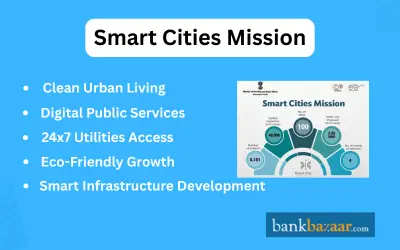Smart Cities Mission 2026
Smart Cities Mission is a government plan to make cities better places to live. It focuses on improving roads, water, safety, and public services using new technology and smart ideas. The aim is to create clean, safe, and easy-to-live-in cities for everyone.
Smart Cities Mission Overview

With more than 31% of India’s population living in cities, and these cities contributing over 63% of the national GDP, urban development is a critical part of India’s economic progress. Recognizing the need for smarter, more efficient, and people-centric urban spaces, the Government of India launched the Smart Cities Mission on June 25, 2015.
This ambitious initiative is designed to drive economic growth, enhance the quality of life, and harness technology to create sustainable and inclusive cities.
Objectives of the Mission
The core objectives of the Smart Cities Mission are to:
- Promote sustainable and inclusive urban development
- Improve the quality of life through technology and innovation
- Provide 24x7 water and power supply
- Modernize waste and sanitation systems
- Enhance urban mobility and transportation
- Strengthen e-governance and citizen engagement
- Attract investment and economic activity
How the Smart Cities Mission Works
The mission uses a unique area-based development model and a citywide smart solution strategy. Here's how it works:
1. Area-Based Development:
- Retrofitting: Upgrading existing city areas
- Redevelopment: Rebuilding entire sections of the city
- Greenfield Development: Creating new smart areas from scratch on unused land
2. Smart Solutions Across the City:
- Implementation of one or more smart systems citywide (e.g., traffic management, water supply, surveillance)
This approach ensures that improvements are visible, measurable, and scalable across different cities.
Features of a Smart City
Smart Cities are built on core infrastructure pillars such as:
- Reliable electricity and water supply
- Efficient waste management
- Affordable housing and public transport
- Strong IT connectivity and digitization
- Safe, secure environments, especially for women and children
- Eco-friendly development
- Access to healthcare and education
- Transparent and responsive governance
Who Funds the Mission?
The Smart Cities Mission operates as a Centrally Sponsored Scheme, where the Central Government and State Governments contribute equal funding for implementation. This joint investment model promotes ownership at both national and local levels.
How Projects are Implemented
To manage implementation, each selected city sets up a Special Purpose Vehicle (SPV) — a company under the Companies Act, 2013. These SPVs are responsible for:
- Planning and managing projects
- Coordinating with Project Management Consultants (PMC)
- Ensuring timely execution and monitoring of proposals
Impact on Citizens
The Smart Cities Mission is citizen-centric, aiming to make everyday life better, safer, and more convenient. Key benefits include:
- Real-time updates through apps and dashboards
- Improved public services and faster response times
- Safer streets and better surveillance
- Cleaner surroundings and more green spaces
- Digital access to government services
- Increased job opportunities and business growth
Opportunities for Businesses and Startups
The mission also opens new avenues for innovation and investment, especially in areas like:
- Urban mobility and transport tech
- Water and waste management
- Renewable energy and sustainability
- Smart governance and digital platforms
Entrepreneurs, developers, and investors can play a major role in building India’s urban future.
Popular Pages in Government Schemes
FAQs on Smart Cities Mission
- When did the Smart Cities Mission start?
It started on June 25, 2015.
- What are the goals of Smart Cities Mission?
The goal is to make cities more livable, sustainable, and efficient by using smart technology and good planning.
- Which cities are part of the Smart Cities Mission?
100 cities across India were selected through a competition to be part of the mission.
- What kind of changes happen in a smart city?
Cities get better roads, smart traffic lights, more green spaces, clean water, improved waste management, and digital services.
- Who runs the Smart Cities Mission?
It is run by the Ministry of Housing and Urban Affairs, Government of India.
- How can citizens benefit from smart cities?
People get better services, cleaner surroundings, safer streets, and easy access to city facilities through apps and online platforms.

Disclaimer
Credit Card:
Credit Score:
Personal Loan:
Home Loan:
Fixed Deposit:
Copyright © 2026 BankBazaar.com.